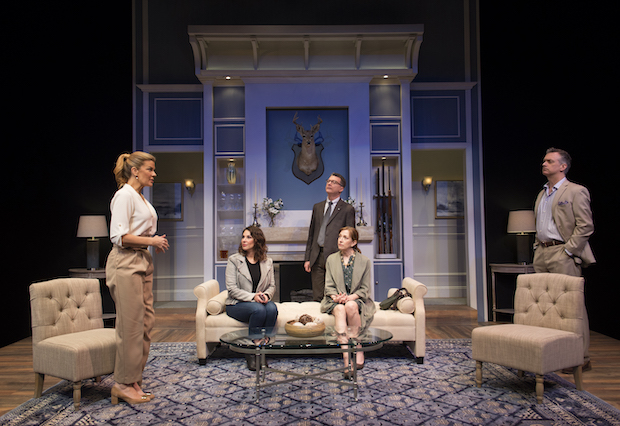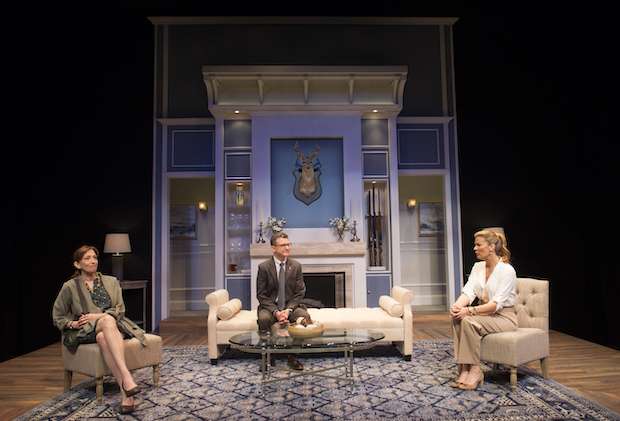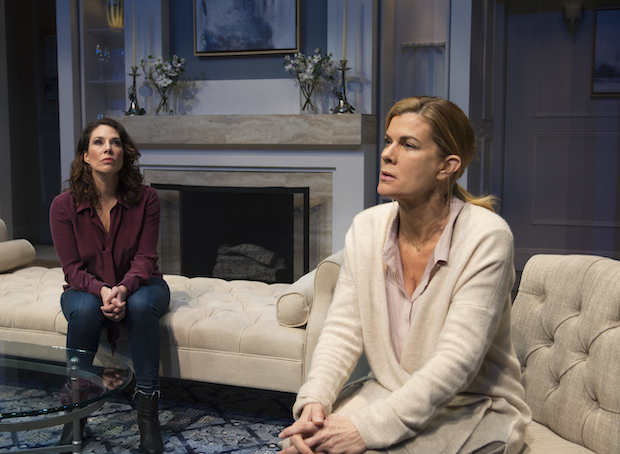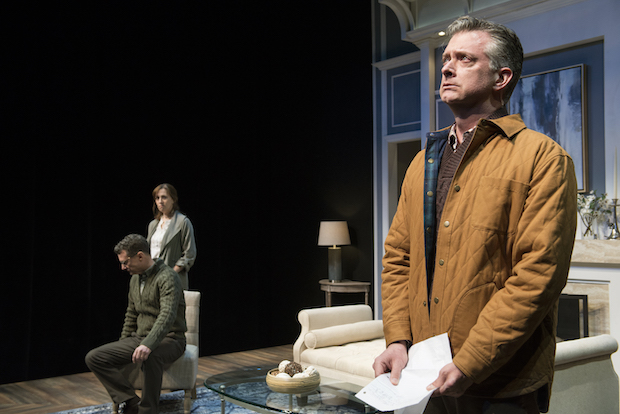Why Do Rich Parents Bend the Rules for Their Kids? After Offers Some Insight
Michael McKeever’s new play is about a bullying incident that spirals out of control.

(© John Quilty)
The Campbells have an almost perfectly symmetrical living room: The blue walls and carpet contrast with the beige furniture, which encircles a coffee table displaying a bowl of wicker baubles, the kind you might encounter in a Pottery Barn catalogue. This horrifying set for Michael McKeever's After at 59E59 is by designer Brian Prather, but it immediately tells us a lot about the compulsions of its fictional designer, Julia Campbell (Mia Matthews).
Julia has made just two concessions to her husband, Tate (Michael Frederic), and they are naturally the elements impeding perfection: A severed deer head hangs over the mantel, like a beloved ancestor. Just stage left of that are three rifles, perhaps the same ones used to bag the buck. We suspect these Chekhovian guns will play a major part in the ensuing 90 minutes of McKeever's play, which, like the living room it occupies, is a little too perfect to be believed.

(© John Quilty)
McKeever (who authored the similarly contrived Daniel's Husband) imagines a series of three meetings (in three acts) between the Campbells and the Beckmans. Julia and Tate's son, Kyle, sent a threatening text message to Michael Beckman. His parents — Alan (Bill Phillips) and Connie (Denise Cormier) — have come to this temple of bourgeois fussiness to discuss the consequences. While their sons' private school has decided to suspend Kyle for three days, that's not enough for Connie: She wants "zero tolerance" to mean just that. She wants Kyle expelled. Tate bristles at her "overly sensitive, politically correct bullsh*t," and we can see exactly where this play is going.
Or so we think. McKeever makes sure to neutralize the issue of electoral politics. When Connie calls Tate a Republican, he retorts, "I am not, nor have I ever been a member of the Republican Party," like he's just been called before the House Un-American Activities Committee (this is just the first of several soapbox moments, and Frederic delivers it with melodious agitation).

(© John Quilty)
Featuring two sets of well-to-do parents staring one another down from across the cultural divide, McKeever's play would look uncomfortably similar to Yasmina Reza's God of Carnage were it not for the presence of a mediator: Val (Jolie Curtsinger) is conveniently both Julia's sister and Connie's good friend. Her attendance to this conflict feels increasingly forced, but not any more than the improbable second and third acts, when these people are shoved back into the same room like feral cats being stuffed into a cardboard box.
Despite the Erector Set construction of his script, McKeever (aided by the week's news) manages to convey some astute observations, particularly about Julia: "The f*cking tiles in the foyer had to be relaid three times because she wasn't happy with the grout," Tate complains of his fastidious wife. And Julia is the first to admit that she likes things to be beautiful and flawless. If she can perfectly engineer her house by throwing money at it, why not try to do the same with her son's life? While Felicity Huffman would have made a deliciously apt casting choice for Julia, Matthews powerfully conveys her character's near-religious faith in Kyle, an only child whom everyone else finds a bit of a disappointment. Still, that's not going to stop Julia from trying to buy their good opinion, much as a wealth manager might try to buy a spot on the Yale soccer team for his daughter.

(© John Quilty)
Joe Brancato directs the cast to credible performances that only occasionally succumb to the heavy sentiment of McKeever's script. The design is similarly competent, if obvious: Martin E. Vreeland's lighting narrows in on certain characters during emotionally fraught moments, like a studious reader highlighting a line in a book. Gregory Gale's costumes riff on the obsessive-compulsive vibe of the set: The Campbells are paired in shades of tan, while the Beckmans don forest green, giving this play the look of a dismal family game show. We know there is no chance of fabulous prizes materializing by the end.
Despite a surfeit of reveals meant to keep us on the edge of our seats, After is a play that sputters to its conclusion. The third act is overloaded with monologues that seem meant to feed us our postshow talking points. Provided you deviate from this guidance, audiences are likely to find those discussions far more stimulating than the preceding play.










